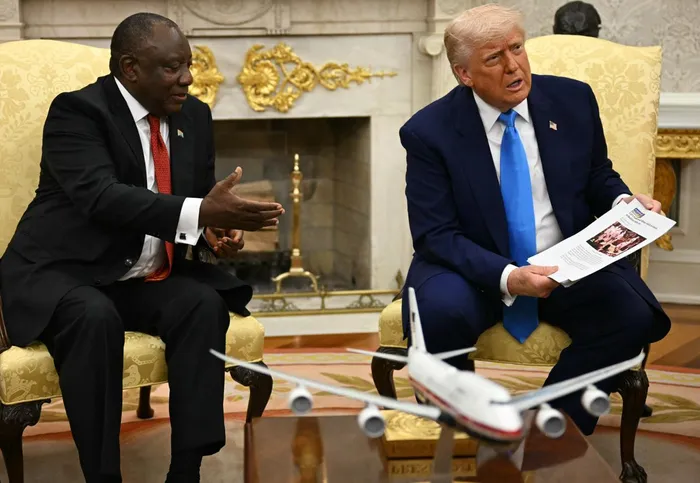By Desmond Nleya
Yesterday’s meeting between U.S. President Donald Trump and President Cyril Ramaphosa may have been framed as a gesture of diplomatic engagement, but in reality, it laid bare the uncomfortable truth about South Africa’s increasingly submissive posture in global geopolitics—particularly when dealing with Western powers who show little regard for its dignity or sovereignty.
While many may give the CR17 kudos for his diplomacy and articulacy, the host seemed determined to embarrass and dress South Africa or better still the African continent down by playing political rally old videos as evidence of the so called ‘white genocide in South Africa’.
Even during the introductory remarks by Donald Trump, there seemed to be a carefully orchestrated plan to humiliate and denigrate South Africa through the President Ramaphosa.
“He called me—I don’t even know where he got my number.” Delivered with his trademark smirk, the comment was meant to entertain, but in diplomatic circles, it amounted to nothing short of public humiliation.
A sitting head of state being reduced to a punchline by a man notorious for his disregard for international protocol? That’s not just disrespect; it’s a slap in the face to South Africa and everything it stands for on the world stage.
Yet, President Ramaphosa stood beside Trump with his trademark composure—calm, diplomatic, and, some would argue, far too passive. While many South Africans may applaud his efforts to “keep the peace” and avoid escalating tensions, one must ask: at what cost?
South Africa has long prided itself on being a beacon of diplomacy, unity, and reconciliation. But diplomacy is not synonymous with deference.
What we witnessed yesterday was not the art of negotiation—it was the performance of compliance. A quiet surrender of national pride under the guise of international cooperation.
While many may argue that Ramaphosa delegation that included some whites and influential business people would help set the record straight that there was no white genocide in South Africa, they did little to challenge or reframe narrative.
Rather,they seemed more preoccupied with maintaining their own transnational ties—silent, polished, and politically convenient. One could hardly distinguish their stance from that of the U.S. administration.
For example, DA leader calling South African Opposition rebels while another golfer talked about problems in their family farm in Polokwane.
‘DONALD TRUMP’S video evidence “proving genocide against white Afrikaners” in South Africa. DISAPPOINTINGLY, instead of emphatically or, as per their plan, ‘calmly’ rebutting this, President Cyril Ramaphosa and his delegation responded by dissing Julius Malema, EFF and MK Party!’ wrote Prof Jonathan Moyo on X.
What South Africa is facing is a slow erosion of its sovereignty under the polite mask of diplomacy. The country once stood as a leader in the global South—firm in its foreign policy, proudly independent, and unafraid to speak truth to power.
Now, we find ourselves groveling at the feet of men like Donald Trump, whose respect for African leadership has always been questionable at best.
The optics of yesterday’s meeting were damning. A powerful Western figure ridiculing an African president, a subdued and unchallenging delegation, and a growing sense among South Africans that our leadership is more concerned with appeasement than advocacy.
Diplomacy, yes. But not at the expense of dignity.
We need a foreign policy that does not just seek to be liked, but that demands to be respected. We need a president who understands that respect is earned not through silence in the face of insult, but through firm, principled leadership.
And we need a government that remembers that sovereignty is not something you trade for photo ops or financial handouts—it’s something you guard with your voice, your vision, and your valor.
As Africans, we must hold our leaders accountable not just for what they say on the global stage, but for what they fail to say. Because sometimes, silence speaks louder than words—and in yesterday’s meeting, it screamed surrender.
Views expressed in this article are those of the author and do not necessarily reflect the official editorial stance of Daily Times.


